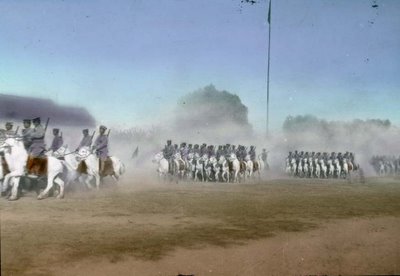General Feng and the Nationalists
The picture is General Feng’s army in 1924, Peking.
Feng Yu-Xiang (1882 – 1948) was referred to as “General Christian” and he chased out the last Qing dynasty emperor Pu Yi out of the Forbidden City and welcomed Dr. Sun Yat-Sen, founder of ROC.
The "Fengian army" was a faction of the Beiyang Army, an important military body that served the Beijing government.
http://www.takungpao.com/news/2005-7-14/ZM-426952.htm
但在北伐勝利後與蔣介石爭奪全國政權時,西北軍卻遭失利,並被分化瓦解,馮玉祥本人也一度隱居泰山。
After the 1927 Northern expedition and victory, General Feng was competing against Chiang, and his Northwestern army was losing and dissolved. Feng went to live in Taishan, Shangdong Province.
1933年8月,侵佔了中國東北全境的日軍分兵入侵平、津,華北局勢危急。馮玉祥不顧蔣介石的反對,從泰山到張家口,組織塞北民眾抗日同盟軍,並迅速發展到八萬人左右。就在抗日同盟軍連戰皆捷,準備興師出關,收復東北之際,曾與他義結金蘭的蔣介石卻調集兵力對身為義兄的馮玉祥實行全面封鎖包圍,並威逼馮取消同盟軍,停止對日作戰。在日寇和蔣介石的共同鎮壓下,馮玉祥迫不得已隱居泰山,
In August 1933, after taking Manchuria, the Japanese army invaded Beijing and Tianjin, to threaten northern China. Feng ignored Chiang’s opposition, to come from Taishan to Zhang Jiakou, to organize the northern border people to resist the Japanese, and develop into 80,000 men. After several winning streaks, when he was about to go out of the great wall gate to fight, to recover the Manchuria land, Chiang encircled Feng to stop the war against Japan. Feng was forced to live in Taishan, Shangdon province.
1937年蘆溝橋事變,全面抗戰爆發,蔣介石請馮玉祥出山,並出任軍事委員會副委員長一職。據馮理達回憶,馮玉祥在抗戰期間抱著共赴國難的願望,奔走各地,視察前線,宣傳抗日,號召青年參軍,並呼籲國共合作,一致對外。由於馮玉祥帶兵有方,西北軍在抗戰期間的表現可圈可點,湧現了一大批抗戰名將,如宋哲元、吉鴻昌、佟麟閣、張自忠、趙登禹、梁冠英、孫連仲等。
After the 1937 Marco Polo bridge incidence, the full scale war exploded. Feng was invited as the vice chairman for the military committee. He enlisted the youth to join the army and wanted the communists and nationalists to cooperate and fight against foreign invasion. His northwestern troops had high achievements and had many famed generals such as Soong Zeyuan, Dong Linge, and Zhang Zizhong etc.
縱馬疆場誓驅虜 功勳未立志不墜
馮玉祥舊部二十九軍在「七七事變」中奮起抵抗日軍。馮玉祥通電舊部將領,囑其努力「抗敵守土」,「以保千萬年之光榮歷史」。
7月28日,馮玉祥部下佟麟閣、趙登禹在與日軍的激戰中犧牲,馮玉祥痛哭,因為佟、趙都從十五六歲起跟著馮玉祥,大家都是同生死共患難的好兄弟。馮玉祥在自傳中說,他一睜眼一閉眼就看見兩位死者在他的眼前。他隨後寫下了一首白話詩,稱讚兩位將軍「二人是一樣的忠,二人是一樣的勇」,並寫道,「你們二位在前面等我,我要不久把你們趕上」。
10月,馮被調回南京,第六戰區亦被撤銷。馮玉祥在這種情況下,仍未消極,曾動員並介紹舊部將領回鄉組織地方抗日武裝。馮自己也利用視察國防工事機會,親自到河南各地宣傳抗日,號召青年參軍,支援前線。
In October, Feng went to Henan Province to ask the youth to join the army to support the frontline.
在河南,馮玉祥曾多次招兵買馬,因為這裡曾有花木蘭代父從軍的故事,有著愛國從軍的傳統。有一天,馮玉祥正在山坡上視察陣地,忽然來了兩位老先生,一人拿著一個籃子,其中裡盛著幾十條黃瓜。兩位老人一見到馮玉祥,就大哭道:「你是馮先生啊?您這幾年跑到哪裡去了?可苦了我們啦!」
In Henan, this is the ancient Hua Mulan, The young girl dressing up like a man to replace her old father to go to the battle zone ancient story. Even the women are patriotic to go to the army.
One day, Feng was on the slope to survey the battle ground, there were two old men to come to see him. One with a basket, it has several dozens of cucumbers. Two old men saw him and cried out loud: “You are Mr. Feng? Where have you been all these years? We are in torment!”
Feng told them to resist against Japan, else you can’t go on. You will owe it to your ancestors and your descendants.
He is the vice military chairman for the Nationalist government, and he did fight in defiance of Chiang Kai-Shek's order not to fight, so we can't finger point that Nationalists didn't fight. In the U.S. foreign policy, we always have to remember the variety of the Nationalist party and personnel, they are not all corrupt, we cannot stereotype them, they are very patriotic and held in high esteem by the people.
馮玉祥告訴他們說,非抗日不能活,非抗日對不住自己的祖先,非抗日對不住自己的子子孫孫,並且亡國奴還不如喪家犬。兩位老人聽了,摩拳擦掌、咬牙切齒,他們說道:「我們老了,不能跟您去,只能讓我們的兒子、孫子、侄子、外甥跟您去,同日本鬼子拚命,為我們的國家來報仇雪恥。」
Comments:
Henan people have very patriotic tradition since ancient time, even the women have the grace to help out.
During the battles of the Nationalists guarding Taiwan, many Henan generals and soldiers were buried in rubbles.
With these savage battles, America never helped out.
In fact, America relied on the Nationalists to help out on the Korean War, in sending the planes. In invoking the peace treaty conditions for Mao to sign in 1953 cease fire treaty, all with sacrifices of blood and will to defend freedom for the country and the people.
But Taiwanese can never appreciate this being the historical facts.
Taiwanese always can bend the story.
If I would to tell them that in 1949 Gu Ning Tou, Quemoy war, it was a bloody battle between Nationalists in facing the invasion of the Communists. They would say that the pain is on Taiwan youth who were dragged to the war from the street. But if you check on the draft system, Taiwanese boys were not drafted in 1949. In fact, there were many Henan soldiers and in 1958, the bombings killed high ranking generals from Henan province.
I believe that General Feng Yu-Xiang (1882-1948) was patriotic, in that, against Chiang Kai-Shek’s orders, in 1933 he defended China against the Japanese in the region outside Beijing.
This is to remind the country that the KMT implemented the unification of the Chinese factions in 1926. The KMT unified the country, and defended China during the Japanese invasion. Economically, they had a great ten year era from 1928-1937, which laid the foundation for the country’s banking infrastructure, which sustained the country during the 8 year war.
After the war, the U.S. did not handle it correctly or fairly, and did not reward its ally China in any sense, so the Nationalists were forced to retreat to Taiwan.Once in Taiwan, the U.S. stopped the Nationalists from returning to China, so the U.S. should feel some responsibility, and not let the KMT disappear under pressure from the DPP and the communists.


0 Comments:
Post a Comment
<< Home